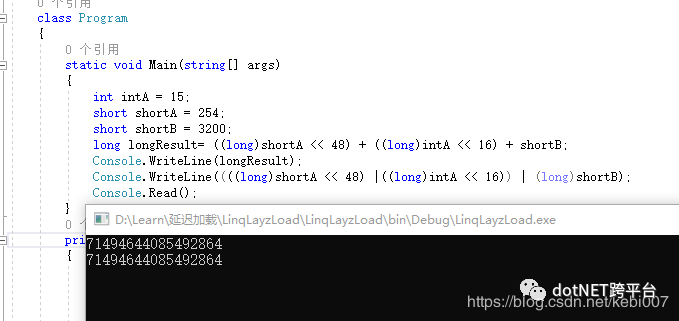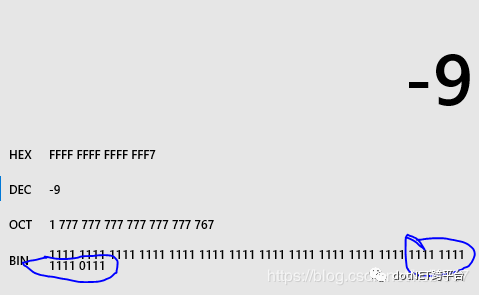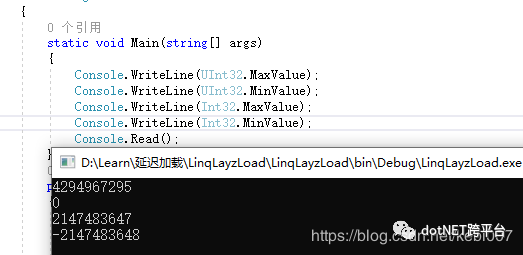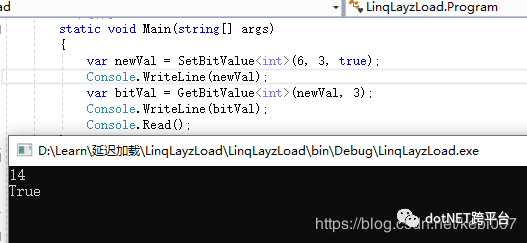1.前言
前几天写了两篇关于c#位运算的文章
c#位运算基本概念与计算过程
C#位运算实际运用
在文中也提到了位运算的实际作用之一就是合并整型,当时引用了一个问题:
C# 用两个short,一个int32拼成一个long型,高16位用short,中间32位用int,最低16位用另外一个short。
答案如下:
高16位shortA、中间32位intA、低16位shortB
longResult=((long)shortA << 48 )+ ((long)intA << 16)+ shortB根据longResult获取前16位shortA,中间32位intA,后16位shortB
shortA=(short)(longResult>>48)
intA=(int)((longResult>>16)&0xFFFFFFFF)
shortB=(short)(longResult&0xFFFF)评论者pushouli、czd890 评论到,合并这个long类型的结果是使用加法计算,可以使用位逻辑或运算,想了想确实使用| 位逻辑或运算也是可以解决问题的,能够实现相互转换。
@ pushouli 用+ 和 | 在这里性能上应该没有太大区别。 但是感觉用 | 更能表达意思一些
longResult=(((long)shortA << 48) |((long)intA << 16)) | (long)shortB1|0=1、1|1=1、0|0=0
其计算结果longResult是一样的,运算方式不一样,其计算过程可以看看前面写的一篇
C#位运算实际运用
如图:
这篇文章就将记录两个知识点:
1.负数的二进制位表示法
2.位运算如何直接操作Int类型某一位
2.负数的二进制位表示法
原码:一个整数按照绝对值的大小转换成的二进制数,称为原码
一个short 16位的整数9的原码是:
0000 0000 0000 1001反码:一个二进制数按位取反,所得的二进制数成为原二进制数的反码
取9的二进制数的反码,可以使用位逻辑非运算 ~
取反后的16位二进制
1111 1111 1111 0110补码:反码加1称为补码,简而言之,要得到一个属的补码,先得到这个数的反码,然后再将反码加上1,所得数称为补码
那么9的补码也就是
1111 1111 1111 0110加上1的结果,如下:
1111 1111 1111 0111即-9的16位二进制表示是
1111 1111 1111 0111如图:
3.c#Int有符号的和无符号的区别
话不多说,直接明确三点结论:
1.实际开发中,都用的是有符号的Int(应该默认强制要求),只有整型有有无符号的特征,Double、Decimal,是没有这种特征的。
2.无符号数中,所有的位都用于直接表示该值的大小。
3.有符号数中,最高位用于表示正负。
这里还是简单地啰嗦几句关于有符号和无符号的区别,UInt32和Int32的区别
这里说的Int指的是32位有符号的类型
Int32的值范围是 -2147483648 至2147483647,也就是
-2的31次方到2的31次方-1
符号位表示的意义就在于此,最前面的位表示正负。
-2148483648的32位二进制是:
1000 0000 0000 0000 0000 0000 0000 00002147483647的32位二进制是:
0111 1111 1111 1111 1111 1111 1111 1111那么c#中UInt32的最大值是什么呢?
UInt32的范围是0到2的32次方4294967295,最大值32位二进制是
1111 1111 1111 1111 1111 1111 1111 1111所以得出结论无符号只能表示正数,有符号可以表示正负数。
如图:
4.c#Int如何直接操作每一位
前面已经说到,Int表示的是有符号的,最高位表示的正负,一个Int有32位,虽然我们可以直接操作这32位,但是如果直接操作明显会改变数据类型的正负、最大范围。
这里写了一个泛型的示例,操作整型(int、short、long)的每一位。
public static IEnumerable<bool> GetIntOfBitList<T>(T intVal)
{
Type intType = intVal.GetType();
byte bitlength = 0;
if (intType == typeof(Int32))
bitlength = 32;
else if (intType == typeof(Int16))
bitlength = 16;
else if (intType == typeof(Int64))
bitlength = 64;
else
throw new ArgumentException("必须是整型");
object intOject = (object)intVal;
var resultList = new List<bool>(bitlength);
for (var i = 0; i < bitlength; i++)
{
var temoIntBit = 1 << i;
if (intType == typeof(Int32))
resultList.Add((((Int32)intOject) & temoIntBit) == temoIntBit);
if (intType == typeof(Int16))
resultList.Add((((Int16)intOject) & temoIntBit) == temoIntBit);
if (intType == typeof(Int64))
resultList.Add((((Int64)intOject) & temoIntBit) == temoIntBit);
}
return resultList;
}
public static bool GetBitValue<T>(T intVal,byte index)
{
Type intType = intVal.GetType();
byte bitlength = 0;
if (intType == typeof(Int32))
bitlength = 32;
else if (intType == typeof(Int16))
bitlength = 16;
else if (intType == typeof(Int64))
bitlength = 64;
else
throw new ArgumentException("必须是整型");
if (index > bitlength-1 || index < 1)
throw new ArgumentOutOfRangeException("index");
object intOject = (object)intVal;
var tempBit = 1 << index;
if (intType == typeof(Int32))
return (((int)intOject) & tempBit) == tempBit;
else if (intType == typeof(Int16))
return (((Int16)intOject) & tempBit) == tempBit;
else
return (((Int64)intOject) & tempBit) == tempBit;
}
public static T SetBitValue<T>(T intVal,byte index,bool bitValue)
{
Type intType = intVal.GetType();
byte bitlength = 0;
if (intType == typeof(Int32))
bitlength = 32;
else if (intType == typeof(Int16))
bitlength = 16;
else if (intType == typeof(Int64))
bitlength = 64;
else
throw new ArgumentException("必须是整型");
if (index >= bitlength-1 || index < 1)
throw new ArgumentOutOfRangeException("index");
object intOject = (object)intVal;
var tempBit = 1 << index;
if (intType == typeof(Int32))
{
int tempInt = (int)intOject;
return (T)((bitValue ? (tempInt | tempBit) : (tempInt & ~tempBit)) as Object);
}
else if (intType == typeof(Int16))
{
Int16 tempInt = (Int16)intOject;
return (T)((bitValue ? (tempInt | tempBit) : (tempInt & ~tempBit)) as Object);
}
else
{
Int64 tempInt = (Int64)intOject;
return (T)((bitValue ? (tempInt | tempBit) : (tempInt & ~tempBit)) as Object);
}
}测试截图:
思考:这个方法能操作负数吗?
原文地址:https://www.cnblogs.com/zhangmumu/p/10805312.html
.NET社区新闻,深度好文,欢迎访问公众号文章汇总 http://www.csharpkit.com 


元素问题(未补))


)







![[开源]OSharpNS - .net core 快速开发框架 - 简介](http://pic.xiahunao.cn/[开源]OSharpNS - .net core 快速开发框架 - 简介)
)
 即将来临!)



